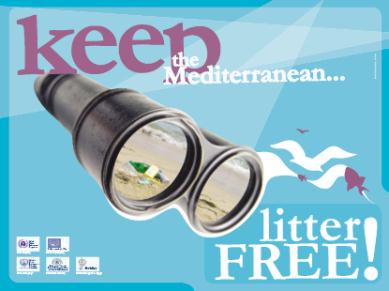Keep the Mediterranean Litter Free Campaign (Regional)
Different types of activities were implemented in several Mediterranean countries such as beach clean-ups, exhibitions and workshops, photo contests, etc. with the participation of educators and students, seafarers and staff of ships’ managing companies, national and local authorities, port authorities, NGOs and the civil society at large. The main “vehicles” of the campaign included: a poster/pamphlet presenting the various causes and impacts of marine litter but also highlighting the role and responsibilities of all actors concerned, produced in 10 languages (Albanian, Arabic, English, French, Greek, Italian, Maltese, Portuguese, Spanish and Turkish); a publication entitled “Public Awareness for the Management of Marine Litter in the Mediterranean" presenting specific sector-based guidelines for the main stakeholders i.e. agriculture, industry, the tourism and maritime sectors, regional, national and local authorities, civil society.
These ‘vehicles’ have been widely disseminated and are used by the aforementioned organizations in their awareness raising efforts till today.
The campaign had an impact on the Contracting Parties to the Barcelona Convention, which eventually contributed to the development of a Policy Document and the associated Strategic Framework for Marine Litter management that was adopted in 2012.
Facts
| Place / Location | Regional |
|---|---|
| Commencement Date |
2008 |
| Duration | Ongoing |
| Theme | Mitigation, Awareness (Cross-cutting) |
| Type of Initiative | Practice/ Activity/ Action, Campaign |
| Initiated by | MIO-ECSDE, the Hellenic Marine Environment Protection Association (HELMEPA) and Clean-up Greece with the financial support of UNEP/MAP MEDPOL. |
| Involved Stakeholders |
Educators and students, seafarers and staff of ships’ managing companies, national and local authorities, port authorities, NGOs and civil society at large. |
| Funding/Financial Support |
MIO-ECSDE, HELMEPA and Clean-up Greece, UNEP/MAP MEDPOL |
| Success Rate |
Very Successful. |
| Case Study prepared by |
Thomais Vlachogianni, MIO-ECSDE, Programme Officer |
| Submitted by | Thomais Vlachogianni, MIO-ECSDE, Programme Officer |
Available documentation and further information
http://www.mio-ecsde.org/articles.asp?cMC=&cID=6&aID=36
